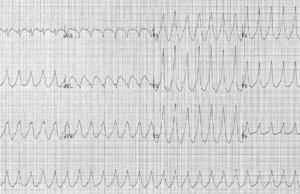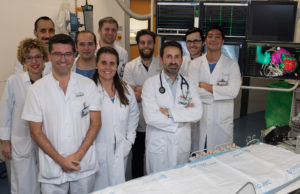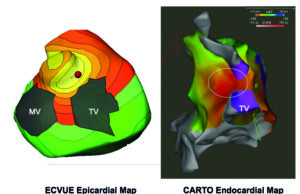Tag: ventricular tachycardia
Field Medical announces promising first-in-human data on treating scar-related VT using...
Field Medical has announced that its FieldForce ablation system was recently featured in a scientific presentation at the 2025 Heart Rhythm Society (HRS) annual...
Field Medical closes US$40 million Series A financing to advance PFA...
Field Medical has announced the successful closing of US$40 million in Series A financing. The round includes US$20 million in new capital and the conversion of US$20 million in seed-round...
European registry elucidates safety outcomes of ventricular arrhythmia treatment with Affera...
A novel cardiac ablation system may hold the potential to improve upon the currently available treatments for ventricular arrhythmia (VA) patients, having demonstrated positive...
Medtronic announces first patient enrolment in trial assessing VT treatment with...
Medtronic recently announced that the first patient has been enrolled in a US Food and Drug Administration (FDA) early feasibility study evaluating the Affera...
FieldForce ablation system earns US FDA TAP pilot acceptance and breakthrough...
Field Medical has announced that its FieldForce ablation system has been accepted into the US Food and Drug Administration (FDA)’s Total Product Life Cycle Advisory...
AHA 2024: Ablation potentially superior to medication for post-heart attack VT
Ablation may be a better first-line treatment for heart attack survivors experiencing dangerous episodes of ventricular tachycardia (VT), according to late-breaking science presented recently...
Adagio completes first procedures in pivotal study of VT cryoablation system
Adagio Medical has announced the completion of the first procedures in the FULCRUM-VT US Food and Drug Administration (FDA) pivotal investigational device exemption (IDE)...
EHRA 2023: Severe COVID-19 associated with life-threatening arrhythmia onset within six...
Patients with severe COVID-19 requiring mechanical ventilation are 16 times more likely to develop ventricular tachycardia within six months compared to their peers without...
Tackling focal VT may improve catheter ablation in structural heart disease
Uncovering and abolishing focal ventricular tachycardia (VT) may further improve outcomes of catheter ablation in the treatment of structural heart disease, a study published...
Successful ablation for ventricular tachycardia associated with markedly reduced mortality in...
Wendy Tzou (University of Colorado School of Medicine, Denver, USA) and colleagues at the International Ventricular Tachycardia Ablation Center Collaborative group (IVTCC) published two...
Noninvasive radioablation: Radiotherapy shows 99.9% VT burden reduction
A small study by Phillip S Cuculich (Washington University School of Medicine, St Louis, USA) et al has shown that radiation therapy, commonly used...
Boston Scientific gets FDA approval for MRI labelling and launches Resonate...
Boston Scientific has launched the Resonate family of implantable cardioverter defibrillator (ICD) and cardiac resynchronisation therapy defibrillator (CRT-D) systems featuring the HeartLogic Heart Failure...
Cardiac sympathetic denervation helps to reduce sustained ventricular tachycardia and ICD...
By Angela Gonzalez
A retrospective study, including the largest series of patients with refractory ventricular tachycardia undergoing cardiac sympathetic denervation for structural heart disease, has...
Multielectrode mapping may be more effective than point-by-point mapping for VT...
Results from the first randomised study comparing multielectrode mapping vs. conventional point-by-point mapping for ventricular tachycardia (VT) substrate ablation procedures have shown that a...
Advances in non-invasive imaging to treat ventricular tachycardia and prevent sudden...
We are standing at a crossroads of non-invasive imaging technologies in the field of electrophysiology. Advances in cardiac magnetic resonance imaging (CMRI) mean that...
In search of innovative technologies for ventricular tachycardia ablation with cryoenergy
A proof-of-concept study has demonstrated that a new cryoablation system, which achieves “much cooler” temperatures than previous cryoablation technologies, is able to create large,...
OSYPKA AG launches HAT500® RF ablation system in Europe
OSYPKA AG has announced the launch of the HAT500® radiofrequency (RF) ablation system in Europe. The device received CE mark in October 2016.
OSYPKA AG,...
Lifelong high endurance exercise may cause arrhythmias
A first-of-its-kind study has found that male veteran athletes have a significantly higher prevalence of arrhythmias such as atrial fibrillation, atrial flutter, sinus pauses,...
Lifelong high endurance exercise may cause arrhythmias
A first-of-its-kind study has found that male veteran athletes have a significantly higher prevalence of arrhythmias such as atrial fibrillation, atrial flutter, sinus pauses,...
King’s College London joins with Cambridge Design Partnership to further develop...
Cambridge Design Partnership recently announced it is working with Kings College London to further develop a new steerable catheter designed to treat complex cardiac...
Relevance of imaging for ventricular tachycardia ablation
Cardiac imaging has emerged as an integral part of mapping and ablation in a variety of complex arrhythmias. Advances in imaging techniques, especially the...
Radiofrequency catheter ablation shows benefits for recurrent ventricular tachycardia patients
A prospective, multicentre study—THERMOCOOL VT—analysing a cohort of non-randomised patients, published in February in the Journal of the American College of Cardiology, has shown...
Ventricular tachycardia ablation in Chagas disease
Guilherme Fenelon (Sao Paulo, Brazil) overviews the role of ablation of ventricular tachycardia in Chagas disease. He says: catheter ablation in Chagas disease remains...
Ablation should be “preferred approach” in drug-resistant ventricular tachycardia
A multicentre, randomised controlled trial has shown that catheter ablation is superior to intensified antiarrhythmic drug therapy in reducing death, appropriate implantable cardioverter defibrillator...






















